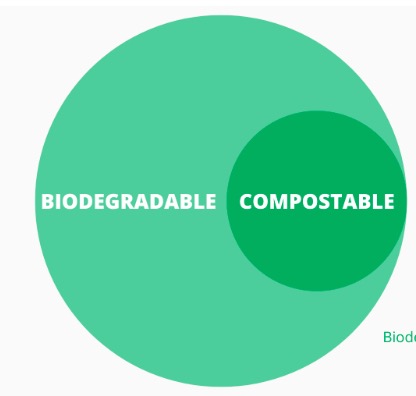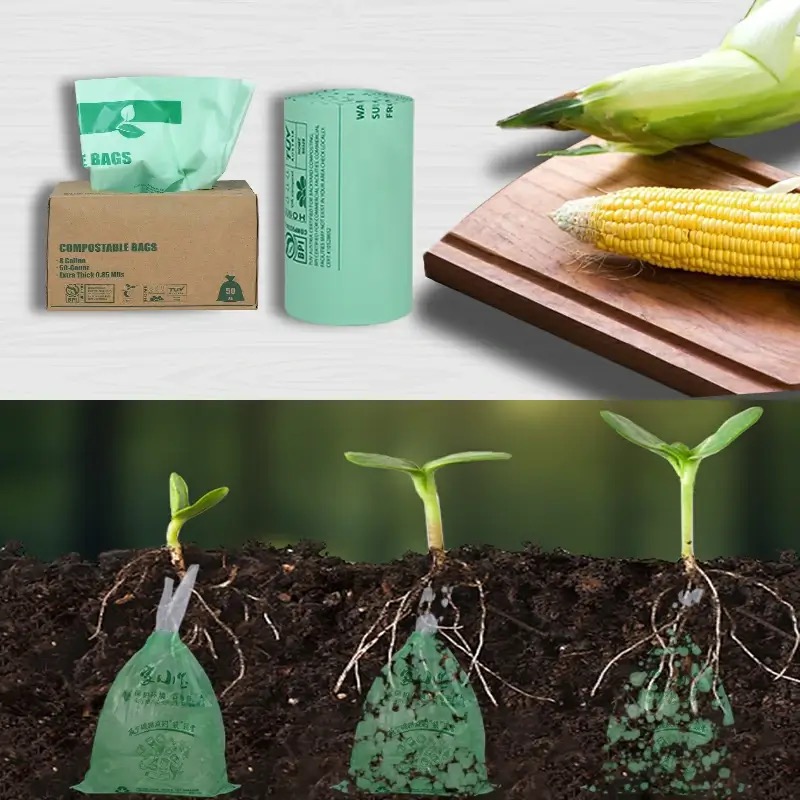If you’re searching for eco-friendly packaging solutions, you’ve likely come across the terms “compostable” and “biodegradable.” They might seem interchangeable at first glance, but there’s a world of difference between them. In this guide, we’ll break it down in simple terms—so you can make informed decisions, whether you’re a brand owner, wholesaler, or eco-conscious consumer.

What Does “Biodegradable” Really Mean?
Biodegradable simply means the product will eventually break down into natural elements like carbon dioxide, water, and biomass.
However:
- No specific time limit: A biodegradable bag could take 1 year or 100 years to degrade.
- Conditions vary: Some bags need industrial conditions to break down properly.
- Microplastics may remain: Some “biodegradable” plastics only break into tiny pieces.
In short, not all biodegradable bags are created equal. Some may leave behind residue or take years to degrade.
What Makes a Bag “Compostable”?
Compostable bags are a specific category of biodegradable materials designed to break down under composting conditions into non-toxic, soil-enriching matter.
Key features:
- Breaks down in 90-180 days under proper composting conditions.
- Leaves no toxic residue or microplastics.
- Often certified by reputable bodies like TÜV Austria, BPI, or EN 13432.
Compostable bags must meet strict international standards and are a safer choice for the environment.

Quick Comparison Table
| Feature | Biodegradable Bags | Compostable Bags |
|---|---|---|
| Breaks Down Into Natural Elements | Yes | Yes |
| Time to Degrade | Varies widely | 90-180 days (standard) |
| Leaves Microplastics? | Possibly | No |
| Certification Standards | Rarely required | Required (BPI, TÜV, EN 13432) |
| Suitable for Home Composting | Not always | Yes (if home compostable certified) |
Which Type Should You Choose?
If you care about reducing plastic waste responsibly and effectively, compostable bags are the better option.
- For businesses: Compostable bags meet more regulations and offer better branding.
- For consumers: They’re safer for compost bins, gardens, and pets.
Look for certifications when sourcing compostable bags. Avoid vague claims like “eco-friendly” or “biodegradable” without proof.
Why It Matters for Bulk Buyers
As plastic bans expand worldwide, choosing the right material matters more than ever. Wholesale buyers and importers should:
- Ask for TÜV or BPI certification
- Confirm if the bags are home or industrial compostable
- Request custom sizes or printing to align with brand values

Final Thoughts
Biodegradable is not always better. Compostable bags offer true environmental value when properly sourced and disposed of. They’re not just a trend—they’re the future of packaging.
If you’re looking to source certified compostable bags in bulk, get in touch with our team at hemcbags.com. We help importers, wholesalers, and eco brands grow sustainably.
FAQs
Are compostable bags better than biodegradable?
Yes. Compostable bags meet strict standards and leave no toxins behind, while biodegradable bags may still pollute.
Can I use compostable bags in a home compost bin?
Yes—but only if they’re labeled as “home compostable” (e.g., TÜV OK Compost Home certified).
Do compostable bags expire?
Yes. They usually have a shelf life of 6-12 months and should be stored in a cool, dry place.
Where can I buy certified compostable bags in bulk?
You can buy directly from hemcbags.com with global shipping, low MOQ, and custom printing.
Slug: compostable-vs-biodegradable-bags
Meta Description: Confused about compostable vs. biodegradable bags? Learn the real difference, which is better, and where to buy certified compostable bags in bulk.

